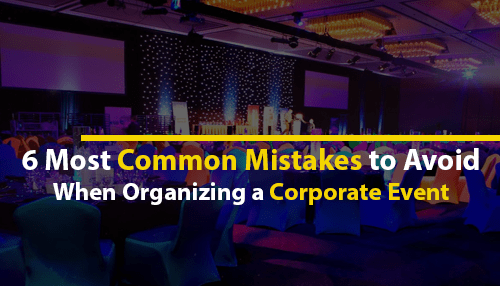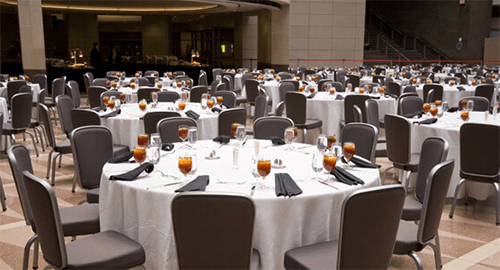Everything has to fall in line if your corporate event is going to be a success and everyone comes away happy that they have had a good day, but that is something that doesn’t happen by chance.
There is a lot of planning and thought that has to go into ensuring that your event runs smoothly and it also helps if you can avoid some of the classic mistakes that can easily throw things off track.
Here is a look at some of the common mistakes that can spoil the day if you are not careful so that you can make sure that you don’t suffer a similar fate with your corporate event.
1. What’s the purpose of your event?
If your corporate event is being arranged without having a clearly defined goal in mind it runs the risk of being a real non-event.
You must know what you want to get out of the event and have some clear goals and objectives.
Knowing exactly what you want to get out of the event will help shape your planning process and give you the best opportunity to put everything in place to achieve these aims.
In addition to clearly defining your goals concerning the event itself is a good idea to set some measurable objectives that will allow you to gauge how successful the event has been afterward.
2. Picking the wrong venue
One of the biggest mistakes you can make is to choose an inappropriate venue for your event.
There are numerous ways to get it wrong, such as picking a place that is too large for the number of delegates who are attending or selecting a venue that doesn’t have good transportation networks, which means that attendance rates will suffer if it’s hard to get to.
You can check out this website to get an idea on top corporate venues and why they work.
Create a checklist of features and options that you want from your venue and use that list as a blueprint for picking somewhere that ticks as many boxes as possible.
The sort of things that you will probably want to look for is good catering facilities, a suitable PA and digital media setup to allow you to make your presentation memorable for all the right reasons, plus a check that the size of your venue is just right for the anticipated number of people attending.
3. The right number in your team
You don’t want delegates complaining that they can’t get a drink or feeling like they have been left to fend for themselves because there are not enough staff around to go round.
If your corporate event is understaffed it could be a potential disaster and it could easily spoil any good impression you make with your presentation or product launch.
If you only have a small team of people working for you it may be the case that you need to hire in some extra staff members for the day.
Staffing costs can be a financial burden and it might be tempting to keep numbers down to save money, but that could prove to be a false economy if your team struggles to cope with all the things they have to do on the day.
4. Prepared for any eventuality
You will always be hopeful that your event will be a great success and everything goes to plan on the day but it is not uncommon for certain things to go wrong and unforeseen circumstances can quickly throw everything into chaos.
It doesn’t have to be that way, and the smart thing to do is accept that something might not go according to plan and talk about some potential scenarios before the event itself.
If your team is prepared for the unexpected and everyone knows what plan B might look like it can help make it easier to respond to negative and challenging scenarios more easily.
Outline a workable contingency plan and make sure your team is well drilled with what to do next when something doesn’t go to plan.
5. A good line of communication
In a similar vein to having a contingency plan, another important aspect of event planning that is often overlooked is the need for clear communication between all the parties involved in putting the event together.
A corporate event requires open dialogue and regular communication with all relevant people and outside companies who are part of the process.
If you are using outside catering or relying on external suppliers, for example, your planning team must be in regular communication with any external sources so that everyone knows exactly what is expected of them and what sort of timescale they are working to.
6. Confused delegates
Staying on the subject of good lines of communication, don’t forget that your delegates need guidance about the event and you will want them to find your event easily once they arrive in the building.
The aim should be to give attendees plenty of information on how to get to the event itself and what you don’t want to suffer from when they get there is a lack of clear signage.
Walk into the building as though you were a delegate yourself beforehand and make sure you display adequate signage that helps everyone get to where they need to be with the minimum of fuss.
Be careful though, as you really don’t want to bombard people with too much information and too many signs and instructions around the building could easily confuse and frustrate people.
If you are taking on the role of event manager you will no doubt appreciate that its a job that comes with a lot of responsibility, but if you plan meticulously and avoid some of the most common mistakes there is no reason why you can’t enjoy a successful day.
Give yourself plenty of time to organize your corporate event and create a checklist and plan that you can work with and share with others.





